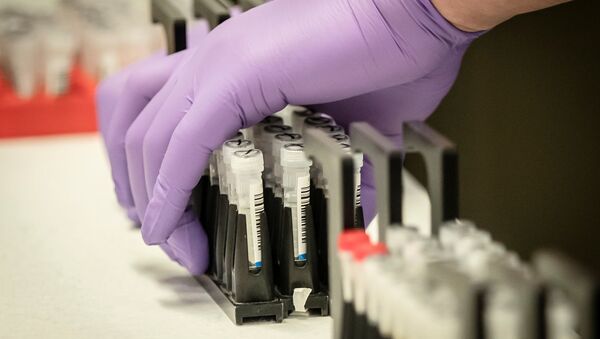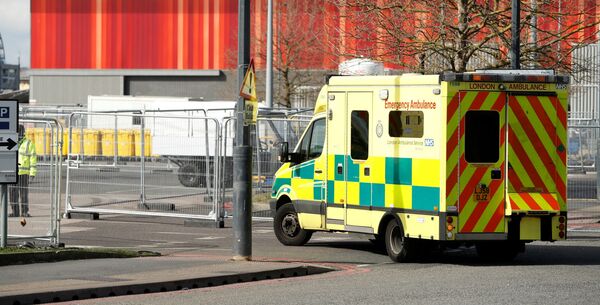British Health Secretary Matt Hancock, who tested positive for coronavirus last week, has set a goal of carrying out 100,000 coronavirus tests a day in the country by the end of April.
On Thursday, Hancock unveiled his "five-pillar" testing plan which envisages: checking if Britons currently have the virus by conducting swab tests; getting universities and private businesses to do more swab tests; conducting new antibody tests for immunity; carrying out a broad survey on how the virus is spreading across the country; and, finally, involving manufacturers and commercial developers to boost Britain's diagnostics industry. Additionally, the UK government plans to roll out "immunity passports" to people who have had the virus and have positive antibody tests to allow them to return to normal life.
'UK Should and Could Ramp Up Testing Earlier'
Professor Alex de Ruyter, an expert in regional economic development at Birmingham City University, foresees that Hancock's plan may face certain logistical challenges.
"I don’t think the challenges will be economic, in the sense of a lack of funds. Rather, the challenges will be logistical: can the UK get enough source material? Can the UK source enough tests? Is the capability of analysing that kind of volume of material there, and can the UK manage the logistics involved?" the professor asks rhetorically, adding that "there should be no obvious financial barrier to this being done".
According to de Ruyter, "one of the challenges in terms of expanding existing testing capacity" is to get "various organisations in different sectors to cooperate, and ensuring high quality results".
Nevertheless, the professor admits that the argument that the UK "should and could" have ramped up testing much earlier and much more quickly "is valid", though "this was less clear" previously: "There is a clear (close to unanswerable) case that the UK Government should have acted about a week before it did on the basis of data out of Italy", he notes.
"If the UK government can test 100,000 people a day by the end of April then in order to test everyone in the UK would take about twenty months", he says. "Initially, the effects will be very modest, primarily in supporting those (NHS workers) who are self-isolating to enable them to return to work".
How Swab & Antibody Tests Could Help
Geraint Johnes, professor of economics at the Lancaster University, specifies that 100,000 COVID-19 tests will include both swab and antibody tests. The latter are aimed at checking whether people have had COVID-19 and are no longer at risk of contracting it again.
"The antibody tests are particularly important because they will identify those who, since they should have some immunity, are well placed to return to situations where they interact with other people", Johnes explains. "Immunity protects the individual, but it also protects the other people with whom the individual comes into contact – so it reduces the spread of the disease".
As Britain moves beyond the peak of the COVID-19 pandemic, "it will become increasingly important to know who can safely return to work – because they have ‘immunity passports’ – and who cannot", he elaborates. Earlier, Hancock predicted that the peak of coronavirus cases could come in next few weeks in the UK.
According to the academic, "this should make possible a managed return to some semblance of normality while ensuring that further spread of the virus stays at a rate that falls within the capacity of the health service".
"Businesses may therefore need to adapt, for a while, to a model where some of their workforce becomes available for frontline operations, while some will have to continue working while following self-isolating guidelines, working from home, or even continue in furlough", he stresses.
The approach is especially relevant given that the UK is among the economies which look set for a downturn that in the short term could be even deeper than during Great Depression of the 1930s, according to data firm IHS Markit and the Chartered Institute of Procurement and Supply.
It Will Take Quite a While for UK to Return to Normal
Even with "immunity passports" being rolled out the British economy will face certain difficulties on the way to returning to normal life, the academics point out.
"The overall economic hit of this episode will be severe, and output in the first half of this year could conceivably be reduced by as much as a half", says Geraint Johnes. "But as immunity allows people to return to work there should be a rapid economic bounceback. We are seeing that in China already, but in other countries such as the UK, where a more gradual approach is being taken to manage the curve, this will take longer".
Alex de Ruyter echoes Johnes by saying that antibody tests have the potential to be an economic “game changer” since they would help the government to identify those immune to the virus and open the door to "a partial return of some staff to a physical place of work", as well as teachers and NHS staff.
"Teachers as key workers could be tested and if a sufficient number tested positive then they could return to work, which would allow at least some schools to reopen", de Ruyter presumes. "Similarly, NHS staff who is tested positive could be sent to the greatest-risk locales in the UK and enable Personal Protective Equipment to be prioritised to those who need it most".





